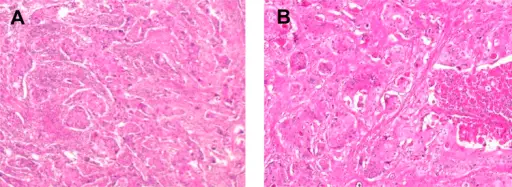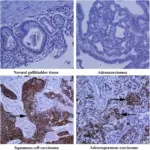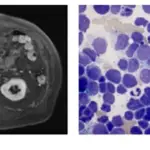Adenosquamous carcinoma of the gallbladder is a rare type of gallbladder carcinoma.
What is the Pathology of Adenosquamous Carcinoma of the Gallbladder?
The pathology of adenosquamous carcinoma of the gallbladder is:
-Etiology: The cause of adenosquamous carcinoma of the gallbladder is not clear.
-Pathogenesis: The sequence of events that lead to adenosquamous carcinoma of the gallbladder is uncertain.
-Morphology: The morphology associated with adenosquamous carcinoma of the gallbladder shows vauge abdominal signs.
-Histology: The histology associated with adenosquamous carcinoma of the gallbladder shows squamous and glandular malignant cells.
How does Adenosquamous Carcinoma of the Gallbladder Present?
Patients with adenosquamous carcinoma of the gallbladder typically are female. The symptoms, features, and clinical findings associated with adenosquamous carcinoma of the gallbladder include abdominal pain, nausea, vomiting, fever with raised total leucocyte count (TLC).
How is Adenosquamous Carcinoma of the Gallbladder Diagnosed?
Adenosquamous carcinoma of the gallbladder is diagnosed with biopsy, and histologic examination.
How is Adenosquamous Carcinoma of the Gallbladder Treated?
Adenosquamous carcinoma of the gallbladder is treated with surgical resection.
What is the Prognosis of Adenosquamous Carcinoma of the Gallbladder?
The prognosis of adenosquamous carcinoma of the gallbladder is fair.



